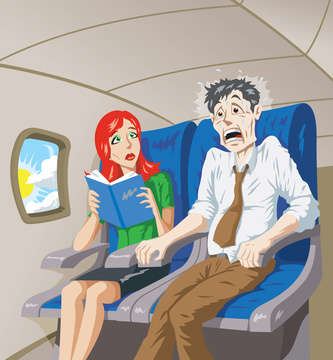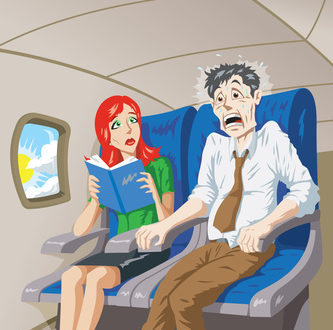 For most people flying raises questions of what you’re going to eat, what you’re going to watch and whether you’ll be able to get any sleep. But for others, stepping aboard a plane comes laced with anxiety. Often, it’s completely irrational. No matter how many times you tell yourself everything’s going to be OK, you can’t help but slip into a state of stress. And no, not even the promise of an exotic new destination or a luxurious holiday can drown out the anxiety.
For most people flying raises questions of what you’re going to eat, what you’re going to watch and whether you’ll be able to get any sleep. But for others, stepping aboard a plane comes laced with anxiety. Often, it’s completely irrational. No matter how many times you tell yourself everything’s going to be OK, you can’t help but slip into a state of stress. And no, not even the promise of an exotic new destination or a luxurious holiday can drown out the anxiety.
The good news is, you’re not along. Officially known as aviophobia, around one in five people suffer from a fear of flying. And just like any phobia, it can be overcome. While you can’t just pop a pill and hope for the best, there are some things you can do to work your way towards becoming a confident flyer. Don’t worry, there’s not a Valium capsule in sight.
Educate yourself
According to Malcolm Hopwood, President of the Royal Australian and New Zealand College of Psychiatrists, one of the most effective ways to ease a fear of flying is to educate yourself about the relatively low risk. “We want our world to be safe. A person with a fear of flying is prone to think that the odds that a crash will occur are much higher than they really are,” he says. “And when news stories about plane crashes appear, they’re likely to be particularly focused on them.” So, a little education can go a long way. For example, in 2016 just 271 people died because of plane crashes. In comparison, around one million people a year die of malaria and 1.2 million people drown. Motor vehicle accidents cause 1.3 million deaths a year, while gastroenteritis claims 1.4 million lives.
Graduated exposure
Another great technique is graduated exposure. This means gently subjecting yourself to the experience of flying, without actually stepping onto a plane. You can start with simply getting comfortable with driving past an airport. Then spending time at an airport without actually catching a flight. Watching planes take off is another great technique. After watching jumbo jet after jumbo jet seamlessly take to the skies, you’re guaranteed to feel a little better. If you have grandkids a few hours watching planes take off at your local airport is a great way to spend an afternoon.
Plug in
Ever heard of music therapy? It works. A fantastic way to calm yourself down before, during and after a flight is by listening to music that relaxes you. Whether it’s meditative chants, classical music or timeless 60s pop, music can work wonders when it comes to reducing stress.
Breathe deep
From battlefields to yoga studios, breathing can be an incredibly powerful technique when it comes to relaxing the mind and the body. It’s a secret weapon in high stress environments, scientifically proven to lower the heart rate and ease adrenalin. Combat tactical breathing is a favourite with therapists and used by everyone from police to soldiers. Basically, you inhale for four seconds, hold for four seconds, then exhale for four seconds. This simple technique works to rebalance the parasympathetic nervous system and efficiently ease that all-consuming sense of anxiety.
Chat to the crew
Airline crews are there to help make your experience as smooth as possible, and if this means easing your fear of flying they’ll usually deliver. Sufferers cite this as one of the absolute best ways to calm nerves, with sheer reassurance from a professional flyer bringing them a huge amount of comfort. When you board the place take a cabin crew member aside and simply let them know you’re a nervous flyer. Ideally, they’ll give you a mini pep talk and keep you in mind if the plane encounters any turbulence. Often a reassuring smile or a quick shoulder squeeze can make all the difference.
Fight not flight
Ultimately, stress is sparked by the brain’s urge to escape a negative situation. So, your constant desire to get off the plane at all costs only escalates the situation. By training yourself to accept the fact that you’re on a plane, as opposed to indulge your desire to flee can drastically reduce anxiety.
Source professional help
Chances are that if you’ve been suffering from a fear of flying for years it’s not simply going to disappear. If you want to fast-track your road to recovery why not consider professional help? Hypnotherapy and BWRT (brain working recursive therapy) are two exciting new techniques that delve deep into your psyche to target the root cause of your fear. Plus, they’re 100% drug free which means you can put that bottle of Valium down thank you very much.
Practice everyday mindfulness
From yoga classes to meditation workshops, incorporating mindfulness into your daily routine will empower you with the ability to mentally rise above your fear. You’ll get better at blocking out background noise, disassociating yourself from turbulence and maintaining a sense of calm while you’re flying.
As you develop confidence with each of these coping mechanisms, the thought of flying will gradually become less intimidating. It won’t happen overnight, but with time things like flight delays, zero legroom and lacklustre plane food will soon become your biggest concerns.









Join the Discussion
Type out your comment here:
You must be logged in to post a comment.